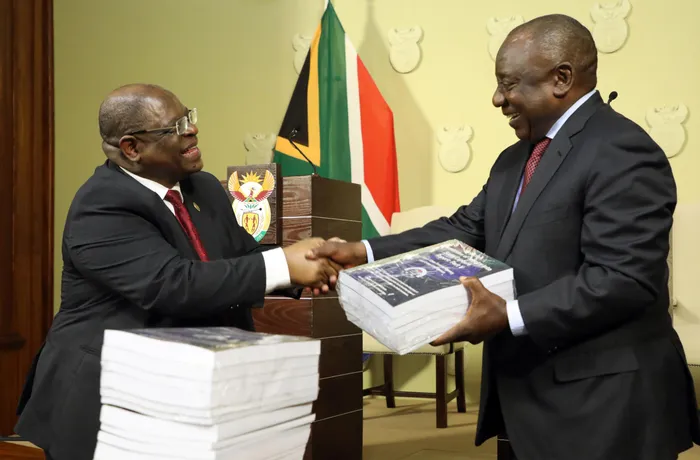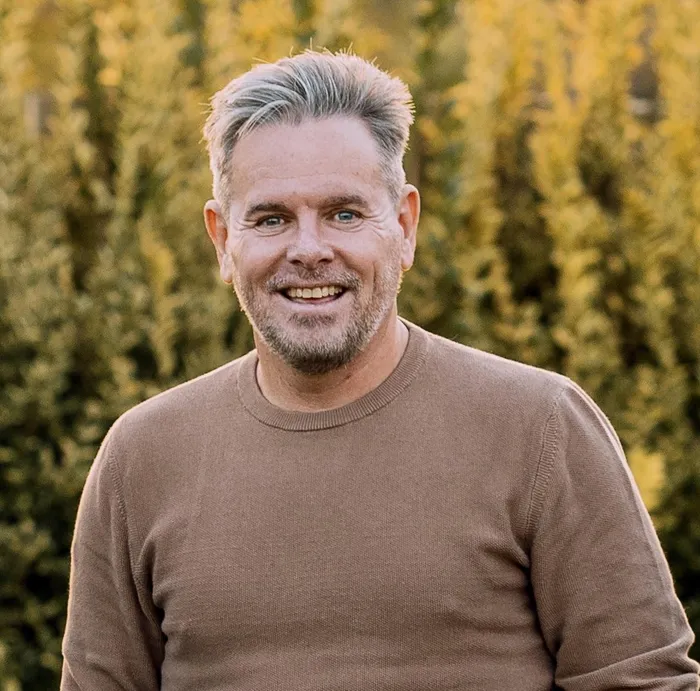South Africa’s Moral Crisis Demands More Than Another Commission
COMMENT

Former Chief Justice and State Capture Commission Chair Raymond Zondo hands over the Commission's final report report to President Cyril Ramaphosa on June 22, 2022. The corruption crisis in South Africa requires more than a commission, argues the writer.
Image: Oupa Mokoena/African News Agency(ANA)
The recent public revelations by KwaZulu-Natal Police Commissioner, Lieutenant-General Nhlanhla Mkhwanazi, strike at the very heart of South Africa’s justice system. When a senior officer in uniform, under oath and under pressure, publicly accuses fellow high-ranking officials, including Police Minister Senzo Mchunu and Deputy Police Commissioner Shadrack Sibiya, of obstructing investigations into political killings and colluding with criminal elements, it is not just a political scandal. It is a national moral crisis.
According to Mkhwanazi, more than 120 cases of politically motivated murders were being investigated when the task team was abruptly shut down. His accusation is simple but staggering: that certain high-level state actors are undermining justice not out of incompetence, but by design. This is beyond accusations of individual corruption. It is a claim of systemic sabotage.
As a Christian leader and South African citizen, I write with deep concern at yet another example of the institutional rot that is hollowing out the pillars of our democracy. What we are witnessing is not just dysfunction but an indication that the erosion of the rule of law that has plagued our nation seems to be accelerating.
This is a pattern that is all too familiar. Time and again we have seen dangerous precedents set where wrongdoing is reported, outrage follows, and then the machinery of delay and deflection kicks in. Justice, if it comes at all, comes too late and too quietly. We need look no further than the Phala Phala scandal, the debacle at Eskom and the widespread looting of municipal funds. We witness the long trail of unresolved State capture and infiltration during the Jacob Zuma presidency and the unfinished accountability from the Zondo Commission.
It is no exaggeration to say that South Africa is caught in a vicious cycle of lawlessness. When high-level corruption goes unpunished, when whistle-blowers are sidelined or silenced, and when commissions of enquiry serve more as political shock absorbers than truth-telling instruments, ordinary citizens begin to lose faith, not only in government, but in the idea of justice itself. When justice is undermined, one of the first casualties is peace. South Africa has become an increasingly violent society, where life is cheap and criminality seems normalised. The danger is not only the crime itself, but our growing numbness to it. Like the proverbial frog in the kettle, we are being boiled alive while telling ourselves that everything is still under control.
We cannot afford to go on this way. We need action. The current call for a new national dialogue is welcome, but it will be fruitless unless the core issues of accountability, transparency, and the protection of the innocent are addressed and acted upon.
South Africa does not need another commission of enquiry. We need courageous leadership that acts decisively on the information we already have and the political will to follow through to ensure that the ends of justice are served. Yes, it is true that individuals are innocent until proven guilty, but that principle cannot be used as a shield to avoid accountability altogether. The process to establish guilt or innocence itself must be rigorous, open and transparent. As the saying goes, “Sunlight is the best disinfectant”.
We are at a place in our nation’s history when the answer will not be found merely in political change, but with a moral renewal. South Africa’s future depends on it. We cannot build a peaceful and prosperous society while the foundations and values that helped to create and sustain it are cracking beneath our feet. We must repair the breach, not paper over it. The time has come for righteous accountability, both from our leaders and from each of us who love this country and long to see it flourish.
The Church will not remain silent while the integrity of our justice system is threatened. We stand with every courageous voice that speaks out against wrongdoing. We are calling on President Cyril Ramaphosa to take bold, visible action — not for political survival, but for the sake of our nation’s soul. We will continue to speak, to serve, to stand and to intercede “until justice rolls down like waters, and righteousness like a mighty stream” (Amos 5:24).
Pastor Bert Pretorius is the President of the South African Community of Faith-Based Fraternals & Federations (SACOFF) and a Senior Pastor at 3C Church, a multi-site church headquartered in Centurion.

Bert Pretorius, senior pastor at 3C Church and president of the South African Community of Faith-based Fraternals and Federations (SACOFF)
Image: SUPPLIED